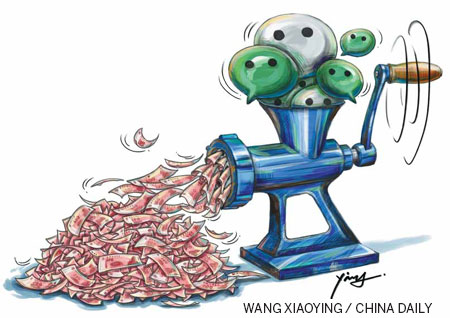A technology that gets you talking
Updated: 2013-04-15 08:00
By Jiang Xueqing (China Daily)
|
||||||||

|
A woman in Shanghai uses WeChat on her smartphone. Users may soon be charged for the service, which is currently free. Provided to China Daily |
Rumors suggest that the days of free mobile voice messaging and texting may soon come to an end, Jiang Xueqing reports in Beijing.
Only two years after the launch of WeChat, the mobile text and voice messaging service developed by Tencent Inc has attracted more than 300 million users.
Kan Kaili, a professor at the School of Economics and Management at Beijing University of Posts and Telecommunications, started using WeChat in November. He was immediately attracted by its convenience for mobile social networking through establishing or joining various groups of friends, colleagues, fellow students and others. As long as they can go online via their mobile phones, users can send text and voice messages as well as photos and small videos to groups or individuals.
"I have joined many groups to connect with my friends," Kan said. "We have group discussions about our work and academic issues on WeChat with overseas academic professionals in the same field joining us."
Another major attraction is that sending messages via WeChat costs nothing; users only pay for mobile data traffic or wireless networks when they cannot get free Wi-Fi access.
Now, Kan rarely uses the text messaging services provided by Chinese telecom operators. Instead, he uses WeChat for both one-on-one and group communication. He has also used the system in preference to international phone calls when traveling overseas. The service has saved him a lot of money.
"If I sent the same number of messages via the text-messaging services provided by telecom operators, I would have to pay several hundred yuan a month," he said.
However, for many Chinese mobile users, the days of sending text and voice messages free of change may soon be over.
'No reason to charge'
In mid-March, rumors began to spread in the media and on the Internet that China's "big three" telecom operators - China Mobile, China Unicom and China Telecom - are likely to start charging Tencent for hosting WeChat and that Tencent could charge WeChat users in return. One rumor, on Sina Weibo, said that from July 1 mobile users will have to pay 0.05 yuan to send a text message via WeChat and 0.10 yuan for a voice message.
Although Tencent has repeatedly denied that it will charge for the use of WeChat, its share price slumped to HK$250 ($32) on April 12 after it reached a record high of HK$286 on March 11. So far, Tencent Holdings Ltd has bought back 6.64 million shares for about HK$1.63 billion during 14 consecutive trading days.
"Telecom operators have no reason to charge users to send messages through WeChat because they have already paid for the data traffic. But the operators might collect fees from Tencent because the volume of traffic on WeChat is particularly high," said Xiang Ligang, secretary-general of the 3G Innovative Applications Forum.

The operators have now realized that the rate they set for WeChat to rent the telecom network was too low. Initially, they had not expected the service to take up a large amount of signaling resources, according to Xiang.
"Users will pay the charges eventually," he said. "Although Tencent dares not charge WeChat users for fear of losing customers, it will find other ways to generate revenue - for example, by offering value-added services."
Some information technology and telecommunications industries experts and professionals are worried that the case will set a precedent for other over-the-top, or OTT, services and hamper innovation.
"Will telecom operators charge commission whenever a successful product appears on the market?" asked Kai-fu Lee, former head of Google China, on Sina Weibo.
It is widely believed - especially among users - that Tencent has taken a significant amount of traditional voice and text-messaging business away from the telecom operators, which has caused them to retaliate.
"As a result of technical innovations, OTT services provide telecom operators with an opportunity for data traffic growth, but they have also become a substitute as well as a challenge to text and multimedia messaging services and even voice services," according to a China Mobile spokesperson in an e-mail to China Daily.
According to the China Mobile's annual report, its wireless data traffic hit 1.04 trillion megabytes in 2012, an increase of 187.6 percent from 2011. Revenue from the wireless data traffic business increased by 53.6 percent to 68 billion yuan ($11 billion).
By contrast, revenue from voice services, which accounted for 66 percent of China Mobile's total operating revenue, increased by just 1.1 percent. Revenue from short message and multimedia messaging services fell by 4.8 percent.
"Monopoly is the essence of the fight between the telecom operators and Tencent," said Du Zide, secretary-general of the China Computer Federation. "If we have full market competition in the telecommunications sector, each company will make great efforts to improve its own service capacity, rather than trying to increase its revenues by adding a new charge."
Operators criticized
In a statement issued on April 6, the federation criticized telecom operators for charging high fees for data transmission through a virtual monopoly. China Mobile, for example, charges 0.1 yuan for a text message of up to 70 Chinese characters, 0.3 yuan for a domestic multimedia message and 1.5 yuan for an international multimedia message of up to 300 kilobytes.
"For many years, these 'monopolies' have made extremely high profits. By using their dominant position, they have attempted to obstruct and force out new technologies and applications through administrative means, instead of producing technological innovations and improving their own competitiveness," said the statement.
The federation also slammed the telecom operators for charging twice for the same service, given that mobile users have already paid for the use of the telecom facilities.
"Charging Tencent for its signaling traffic would be like charging for the names, addresses and post codes on envelopes. That's ridiculous," said Du.
China Mobile did not mention in its e-mail whether it, or the other major telecom operators, will charge Tencent for hosting WeChat. Instead, the company blamed OTT services for occupying the signaling channel continually, causing congestion in the network, something that not only affects the quality of basic telecommunication services, but also endangers network safety; OTT applications have increased the volume of signaling traffic and led to telecom operators overseas suffering network outages.
In the telecom industry, signaling refers to the practice of sending a signal from the transmitting end of a telecom circuit to inform a user at the receiving end that a message is to be sent. Like a switch, it controls the beginning and end of the information exchange.
"In the past, the establishment of telecommunication behavior (such as constantly polling the network to establish new connections) was not so frequent, so we assigned a relatively narrow channel to signaling," said a China Mobile employee who preferred not to be named. "But messages are constantly sent to the servers to let them know that users are still online. As a result, our signaling channel is congested. It has affected regular mobile telecommunications services, such as voice services."
"On the one hand, we will put more resources and investment into expanding our network capacity. On the other hand, we are calling for the establishment of a mechanism to administer third-party applications and prevent them from occupying public resources unscientifically and uneconomically," he said.
Technological innovation
However, according to the China Computer Federation, the telecom operators have not provided sufficient independently certified data to prove that WeChat's signaling has caused the telecom network to crash.
Even if the problem really is serious, several providers of telecom equipment and network solutions, such as ZTE Corp, have claimed they can solve the problem through technological renovation, said Du of the federation.
"When talking about the signaling problem, China Mobile avoided mentioning a crucial element - that is, the company's 2G (second generation) network is not designed for large-scale data services," said Kan of the University of Posts and Telecommunications.
China Unicom and China Telecom have no such problem because they have built 3G networks, he added.
On March 25, China Telecom denied it was in negotiations with Tencent regarding charges for WeChat. According to a company representative, OTT services have affected voice services and traditional value-added services to a certain degree, but they have also helped China Telecom to exploit its advantages in 3G networks and promoted rapid growth in mobile-data services.
In an e-mailed reply to questions from China Daily, Tencent said it has conducted technological optimization of the 2G/2.5G networks and hopes to reduce the pressure of WeChat's signaling to gateways through technical communication, cooperation and innovations with telecom operators.
"In China, telecommunications services are divided into basic telecom services and value-added services. Only the three main telecom operators are allowed to provide basic telecom services. But WeChat redefines what is a value-added service and what is a basic telecommunications service. That's what makes the operators afraid," said a partner at a Beijing law firm, who asked not to be named. "WeChat will also change the current structure of interest (the market share) among the major telecom operators," he said.
China Mobile has reacted strongly to WeChat because the service has placed a heavy burden on its signaling channel across the 2G network. The money earned from WeChat's data traffic can't cover the company's investment in the basic network, including signaling channels, he added.
This year, China Mobile will invest more than 41 billion yuan in its mobile communications networks, including its TD-LTE 4G network. The lawyer said the company stands to lose a great opportunity for development if it continues to fight the fast-growing WeChat. Once construction of its 4G network is complete, in three to five years, the growth of the network will rely heavily on data traffic brought by apps such as WeChat.
"Sooner or later, WeChat will build innovative business models such as mobile payment, mobile banking and mobile advertising to bring in huge revenues. Telecom operators should sit down with the service providers to discuss whether or not to charge fees for using the service, how much those fees will be and how they will be paid," he said.
Contact the writer at jiangxueqing@chinadaily.com.cn

 In Photos: 7.0-magnitude quake hits Sichuan
In Photos: 7.0-magnitude quake hits Sichuan
 Li Na on Time cover, makes influential 100 list
Li Na on Time cover, makes influential 100 list
 FBI releases photos of 2 Boston bombings suspects
FBI releases photos of 2 Boston bombings suspects
 World's wackiest hairstyles
World's wackiest hairstyles
 Sandstorms strike Northwest China
Sandstorms strike Northwest China
 Never-seen photos of Madonna on display
Never-seen photos of Madonna on display
 H7N9 outbreak linked to waterfowl migration
H7N9 outbreak linked to waterfowl migration
 Dozens feared dead in Texas plant blast
Dozens feared dead in Texas plant blast
Most Viewed
Editor's Picks

|

|

|

|

|

|
Today's Top News
Live report: 7.0-magnitude quake hits Sichuan, heavy casualties feared
Boston suspect cornered on boat
Cross-talk artist helps to spread the word
'Green' awareness levels drop in Beijing
Palace Museum spruces up
First couple on Time's list of most influential
H7N9 flu transmission studied
Trading channels 'need to broaden'
US Weekly

|

|








